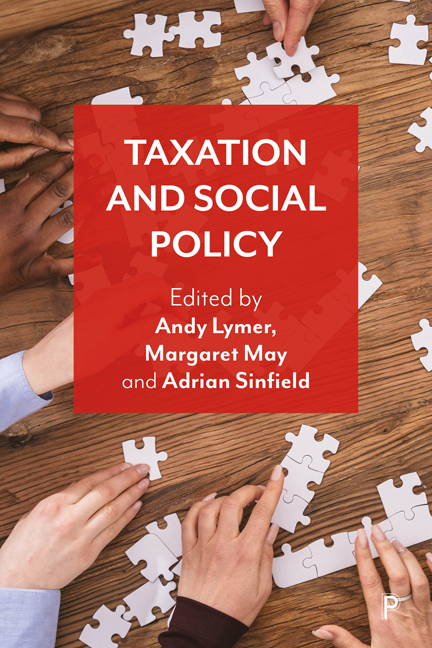Book contents
- Frontmatter
- Contents
- List of figures and tables
- List of abbreviations
- Notes on contributors
- Acknowledgements
- 1 Introduction: The case for considering taxation and social policy togethe
- 2 Fiscal and social policy: two sides of the same coin
- 3 Tax and the social policy landscape
- 4 Fiscal welfare and tax expenditures
- 5 Employment, self-employment and taxation
- 6 Pensions and taxation
- 7 Tax, benefits and household income
- 8 Taxation, health and social care
- 9 Homes, housing and taxation
- 10 Wealth taxation: the case for reform
- 11 Gender and taxation
- 12 Taxation and local taxes
- 13 Corporate tax and corporate welfare
- 14 The climate crisis and taxation
- 15 Conclusions: Taxation in a social policy context
- Index
15 - Conclusions: Taxation in a social policy context
Published online by Cambridge University Press: 20 January 2024
- Frontmatter
- Contents
- List of figures and tables
- List of abbreviations
- Notes on contributors
- Acknowledgements
- 1 Introduction: The case for considering taxation and social policy togethe
- 2 Fiscal and social policy: two sides of the same coin
- 3 Tax and the social policy landscape
- 4 Fiscal welfare and tax expenditures
- 5 Employment, self-employment and taxation
- 6 Pensions and taxation
- 7 Tax, benefits and household income
- 8 Taxation, health and social care
- 9 Homes, housing and taxation
- 10 Wealth taxation: the case for reform
- 11 Gender and taxation
- 12 Taxation and local taxes
- 13 Corporate tax and corporate welfare
- 14 The climate crisis and taxation
- 15 Conclusions: Taxation in a social policy context
- Index
Summary
In creating this book, we set out to fill a major gap in social policy and taxation studies by examining the tax– social policy nexus in the UK and its frequently overlooked effects, building on the identically titled volume of 1980 (Sandford et al, 1980). In doing so, we have deliberately taken account of a wider range of taxes and policy domains than the editors and authors of the 1980 text focused on. We examine their interaction with and impact on society, politics and the economy as well as continuing to pursue many of the questions the 1980 book raised and reviewing how these discussions have evolved in the more than 40 years since then. In summing up, we also reflect on how the intertwining of taxation and social policy could be better examined to encourage further research and improve the situation we find ourselves in, particularly that of those most in need of support.
The multiple interactions of tax and social policy
What comes across strongly in all the chapters of this book are the myriad ways in which taxation operates as an instrument of social policy and the value of examining the two in tandem. In this, we echo Sandford et al (1980, p 228), whose first conclusion, one that emerged ‘with almost overwhelming force’, was the sheer ‘extent and complexity of the inter-relationship between taxation and social policy’. In the 40 years since, this remains as true as ever. Indeed, if anything it has become an even more ‘complex and constantly changing environment’, as Lymer demonstrates in Chapter 3.
To cite just two from the many examples in this book, Lymer, Gregory and Wynter's assessment of taxation's impact on homes and housing (Chapter 9) reveals the long-term, pervasive role of fiscal policies in supporting owneroccupation at the expense of other tenures – a bias maintained often long after direct subsidies had been reduced or ended and paralleled by the lack of measures to support alternatives. As they and Rowlingson (Chapter 10) also highlight, the structuring of inheritance tax for passing on the family home reinforces this differentiation and the many inequities and inequalities flowing from it.
- Type
- Chapter
- Information
- Taxation and Social Policy , pp. 267 - 281Publisher: Bristol University PressPrint publication year: 2023



